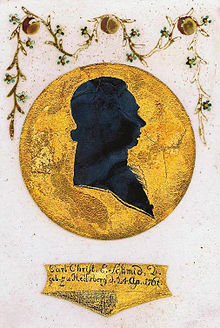Carl Christian Erhard Schmid
Carl Christian Erhard Schmid (born April 24, 1761 in Heilsberg ; † April 10, 1812 in Jena ) was a German theologian and philosopher and came as the most prominent representative of the teachings of Immanuel Kant in Jena in the 1790s with all the important representatives of early Romanticism and the Idealism in contact.
Life
Carl Christian Erhard was born as the son of pastor Gottlieb Ludwig Schmid (1721–1796) and Beate Weissenborns († 1761), daughter of the professor of theology in Jena Jesaias Friedrich Weissenborn . In 1778 he attended the University of Jena and in 1781 traveled through the Braunschweigische Lands as a private tutor for Novalis . In 1782 he became a private tutor in Schauberg near Coburg, acquired the academic degree of a master's degree in philosophy in Jena in 1784, then rose to the position of adjunct of the philosophical faculty and in 1787 became his father's substitute parish in Wenigenjena. In 1791 he was appointed professor of logic and metaphysics at the University of Giessen , and in 1793 he moved to the University of Jena as professor of philosophy, where he was also a deacon and garrison pastor. In 1794 he became the third professor of theology, in 1800 he received a doctorate in theology, in 1804 was a church councilor in Saxony-Weimar and in 1809 a doctor of medicine. Schmid also took part in the organizational tasks of the Jena Salana and was rector of the Alma Mater in the winter semesters 1800, 1801, 1808 and in the summer semester 1801 .
Soon afterwards Schmid published a written version of his lectures (Critique of Pure Reason in the Outline, together with a dictionary for easier use of the Kantian writings) . This publication established his reputation as a conservative exegete of Kantian philosophy. As a colleague and friend of Friedrich Schiller, he married this in his village church in February 1790 with Charlotte von Lengefeld .
Philosophically, Schmid soon came into conflict with Karl Leonhard Reinhold and Johann Gottlieb Fichte . Contrary to their views, Schmid rejected the possibility of a philosophy based on the highest principle. In addition, Schmid represented an intelligible fatalism , which was particularly fought against by freedom-loving Fichte.
Schmid's importance lies less in his own philosophy than in his mediating role in Jena. There he was Novalis's fatherly friend, and a frequent guest and friend of Schiller. He was valued by Johann Wolfgang von Goethe . Almost all of the early romantics who were gathered in Jena in the 1890s got their knowledge of Kant less from the difficult-to-read original writings than from Schmid's lively lectures. The whole ingenious generation that came together here not only worked their way off the conservative Schmid, they also learned almost everything about Kant.
Schmid married Bernhardine Sophie Schmid (born September 25, 1778 in Jena; † May 5, 1822 in Plauen), the daughter of the Jena theologian Johann Wilhelm Schmid , on March 20, 1796 . The marriage resulted in seven children, five of whom died young. We know the sons Johann Heinrich Theodor Schmid (born June 24, 1799 in Jena; † January 29, 1836 in Heidelberg) a professor of philosophy and Leonhard Reinhold Schmid (born April 29, 1800 in Jena; † April 21, 1873 ibid.) , a professor of law.
Works (selection)
- Critique of pure reason in the outline of lectures, along with a dictionary for easier use of the Kantian writings. Jena 1786
- Attempt at a moral philosophy. Jena 1790
- Outline of moral philosophy. Jena 1793
- Outline of natural law. Jena 1795
- Empirical psychology. Jena 1791
- Physiology, philosophically. Jena, 1798, 1799, 1801 (3 vol.)
literature
- Heinrich Döring : The learned theologians of Germany in the eighteenth and nineteenth centuries. Volume 3. Johann Karl Gottfried Wagner, Neustadt an der Orla 1833, pp. 797-801 ( digitized in the Google book search).
- Friedrich Wilhelm Graf : Schmid, Carl Christian Erhard. In: New German Biography (NDB). Volume 23, Duncker & Humblot, Berlin 2007, ISBN 978-3-428-11204-3 , p. 139 f. ( Digitized version ).
- Georg Christoph Hamberger , Johann Georg Meusel : The learned Teutschland or lexicon of the now living German writers. 5th edition. Volume 7. Meyer, Lemgo 1798, p. 208 ( digitized version ); Volume 10, 1803, p. 595 ( digitized version ); Volume 11, 1805, p. 673 ( digitized version ); Volume 15, 1811, p. 332 ( digitized version ); Volume 20, 1825, p. 174 ( digitized version ).
- Wendelin Koehler: Johannes Schmid's descendants. 400 years of Thuringian family history - princely officials and scholars. BoD, Norderstedt 2013, p. 151 f.
- Horst Schröpfer: Carl Christian Erhard Schmid - the "most important Kantian" at the University of Jena in the 18th century . In: Norbert Hinske , Erhard Lange, Horst Schröpfer (eds.): The departure into Kantianism. Early Kantianism at the University of Jena from 1785–1800 and its prehistory . Frommann-Holzboog, Stuttgart-Bad Cannstatt 1995, ISBN 3-7728-1533-2 , p. 37-83 .
- Friedrich Wilhelm Strieder : Basis for a Hessian scholar and writer story. Volume 13. JHG Griesbach, Kassel 1802, p. 96 f. ( Digitized in the Google book search).
- Georg von Wallwitz: The interpretation and shaping of Kant's philosophy by Carl Christian Erhard Schmid (1762-1812). Shaker, Aachen 1998 (dissertation, University of Tübingen, 1998).
Web links
- Literature by and about Carl Christian Erhard Schmid in the catalog of the German National Library
- Works by and about Carl Christian Erhard Schmid in the German Digital Library
| personal data | |
|---|---|
| SURNAME | Schmid, Carl Christian Erhard |
| BRIEF DESCRIPTION | German theologian and philosopher |
| DATE OF BIRTH | April 24, 1761 |
| PLACE OF BIRTH | Heilsberg |
| DATE OF DEATH | April 10, 1812 |
| Place of death | Jena |
